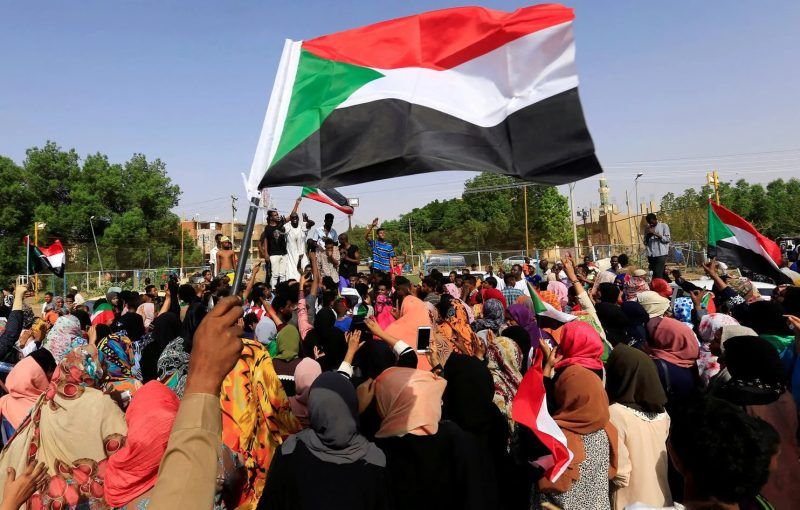
The announcement Thursday by Sudan’s transitional military government that it had foiled an attempted coup was the latest setback to a power-sharing deal meant to structure a three-year transition set to culminate in democratic elections.
The agreement came after months of sustained protest that forced Omar Hassan al-Bashir, the country’s long-ruling president, to step down in April. After Bashir’s departure, the protest movement struggled to negotiate with a transitional military government led by top lieutenants of the former regime. The negotiations ended abruptly June 3, when troops attacked pro-democracy demonstrators in Khartoum, killing at least 100 people and injuring 300.
International pressure helped restart negotiations that surprised many observers by producing an agreement initially hailed by both sides. The agreement would establish a power-sharing government between the military and the pro-democracy Force for Freedom and Change (FFC). The deal stipulates the creation of a council and a cabinet, which will help administer the country. It is also expected to establish an independent commission to investigate violence against civilians during the uprisings, particularly the June 3 massacre that killed more than 100 protesters and stalled initial negotiations.
The deal has not yet been formally implemented. After the initial excitement, however, attention turned to the many potential pitfalls and unanswered questions in the agreement. What can we expect from the agreement during the transitional period and after it expires?
How will sharing power work?
The military council and the pro-democracy group agreed to form a joint sovereign council that will govern Sudan until mid-2020: Per the agreement, the military will rule for the first 21 months — after which the civilian council will govern for the next 18 months. Lt. Gen. Abdel Fattah al-Burhan, the leader of the transitional military council, is expected to serve as president.
There are reasons to anticipate that the military will try to outmaneuver civilian politicians during the long transitional period. The civilian coalition is made up of people and organizations that protested for all matter of reasons, ranging from the economy to local grievances. The group has little to no shared ideological foundation. The military exploited this weakness during negotiations and is likely to try to exploit it again.
The executive council agreed the transition team will be made up of 11 members, five from each group, with the last agreed upon by both parties. It is unclear whether the 11th member will be a civilian or from the military, though the mediators referred to the person as a civilian. The 11th member is likely to be the power broker in decision-making and legislation, especially given the probable extended absence of a legislature. This makes the identity of the final member extremely important, but so far little is known about the appointment process.
Sequencing the agreement
Protest leaders agreed to a protracted transition because they worried about premature elections in which they would not be able to effectively compete. The fact that military officials will govern the country for the first 21 months — without the legislature for the next three months — gives them a critical advantage. During this time, they can make laws to protect themselves and set precedent for the civilian government to follow.
Legislators are expected to be elected, at the earliest, by September 2019. But again, there are a lot of missing pieces. There is no information on how the legislature will be elected, who can contest the elections, the timeline for the elections or details on a new constitution. The military can exploit this ambiguity by delaying the establishment of the legislature or by adopting rules that favor their candidates.
What can civilians do?
The deal did give the civilian coalition some victories. They select the members of the technocratic cabinet to be formed independently of the generals. As the transition continues, the various interests and visions within the Force for Freedom and Change may become more apparent. The FFC is made up of civil groups and opposition political parties, with little to unify them beyond the demand for civil government. This could weaken their hand as the political battle turns to the details of the new system.
To prevent the military from dominating transition, people will probably have to continue protesting to maintain pressure. This presents a huge challenge because there are no clear unifying factors that bind the pro-democracy groups together aside from the call for a civilian government. It would be natural for mobilization to wane if Sudan moves toward some form of normal politics. However, demobilization could critically weaken their bargaining position. So far, protesters have defied expectations regarding demobilization, but they could return to the streets to press their demands, particularly if the transitional government fails to implement the tenets of the agreement.
Transitional justice and peace
The agreement included a commitment to investigate all atrocities committed after Bashir’s ouster, but the makeup of the independent body tasked to investigate these crimes is unknown. The military — the primary target of such investigations — is likely to have influence on how it is formed as the initial head of the government. The role of Lt. Gen. Mohamed Hamdan Dagolo (Hemedti), the second-in-command and the head of the paramilitary group accused of most of the brutalities, is of particular concern. So whether and how the government will pursue justice is unclear.
The agreement has brought some stability to Sudan, but many potential pitfalls remain before a transition can succeed. The selection of the 11th member of the council, legislative elections in the next three months, the establishment of an independent judiciary and the implementation of transitional justice will be key indicators of whether the agreement will succeed.
Richmond Danso is a doctoral candidate at Howard University.
